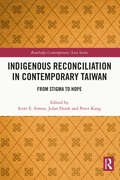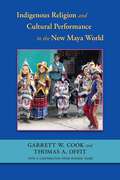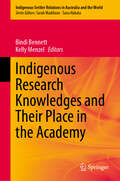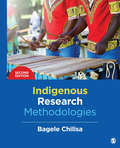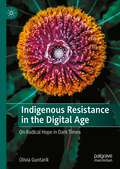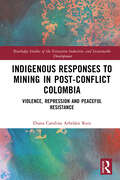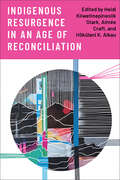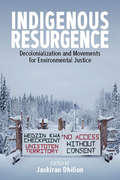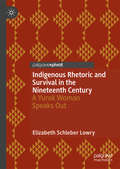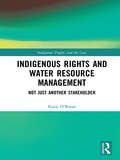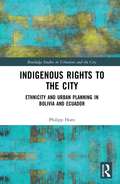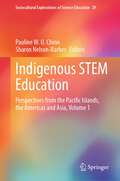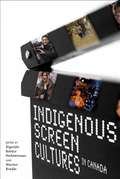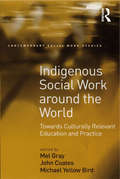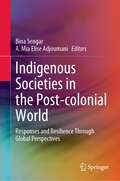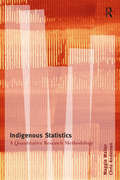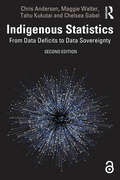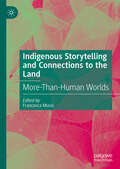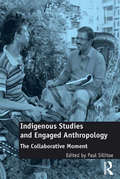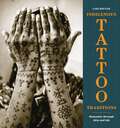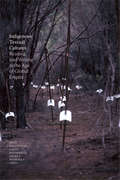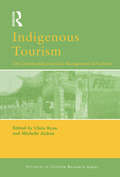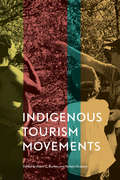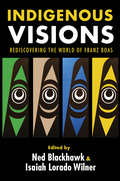- Table View
- List View
Indigenous Reconciliation in Contemporary Taiwan: From Stigma to Hope (Routledge Contemporary Asia Series)
by Peter Kang Jolan Hsieh Scott E. SimonThis book draws attention to the issues of Indigenous justice and reconciliation in Taiwan, exploring how Indigenous actors affirm their rights through explicitly political and legal strategies, but also through subtle forms of justice work in films, language instruction, museums, and handicraft production. Taiwan’s Indigenous peoples have been colonized by successive external regimes, mobilized into war for Imperial Japan, stigmatized as primitive "mountain compatriots" in need of modernization, and instrumentalized as proof of Taiwan’s unique identity vis-à-vis China. Taiwan’s government now encapsulates them in democratic institutions of indigeneity. This volume emphasizes that there is new hope for real justice in an era in which states and Indigenous peoples seek meaningful forms of reconciliation at all levels and arenas of social life. The chapters, written by leading Indigenous, Taiwanese, and international scholars in their respective fields, examine concrete situations in which Indigenous peoples seek justice and decolonization from the perspectives of territory and sovereignty, social work and justice. Illustrating that there is new hope for real justice in an era in which states and Indigenous peoples seek meaningful forms of reconciliation, this book is an invaluable resource for students and scholars of Taiwan Studies, Indigenous Studies and Social Justice Studies.
Indigenous Religion and Cultural Performance in the New Maya World
by Thomas A. Offit Garrett W. CookBased on more than thirty years of ethnographic fieldwork in Highland Guatemala, this study of Maya diviners, shamans, ritual dancers, and religious brotherhoods describes the radical changes in traditional Maya religious practice wrought by economic globalization and political turmoil. Focusing on the primary participants in the annual festival in the K&’iche&’ Maya village of Santiago Momostenango, the authors show how older religious traditionalists and the new generation of &“cultural activist&” religious practitioners interact within a single local community, and how their competing agendas for adapting Maya religiosity to a new and continually changing political economy are perpetuating and changing Maya religious traditions.
Indigenous Research Knowledges and Their Place in the Academy (Indigenous-Settler Relations in Australia and the World #7)
by Bindi Bennett Kelly MenzelThis book privileges Indigenous ways of knowing, being and doing in research and serves as a voice in taking on some of the more marginal topics within methodologies. It is significant in that it is written by indigenous scholars themselves. The contributors shed light, for example, on Queer BlaQ bodies and place Indigenous women as central in reimagining fair academic practice; others return to their foundational texts to reflect on the growth of Indigenous Standpoint Theory. This book sees Indigenous Peoples as holding greater significance within research objectives and institutional practices and reimagines a research world embracing storytelling as foundational to academia. It is intended for students and early researchers, particularly Indigenous researchers, whilst also serving as an invaluable textbook for non-Indigenous people as it aids in explaining and outlining Indigenous research and is a valuable tool in the classroom and with research students. It demonstrates that Indigenous research approaches can sit beside and be equal to Western research, especially when engaging with the ethics process and for PhD students. This book is invaluable for non-Indigenous allies and researchers globally to further explain and outline Aboriginal (Australian) Indigenous research.
Indigenous Research Methodologies
by Dr. Bagele ChilisaAuthor Bagele Chilisa updates her groundbreaking book to give a new generation of scholars a crucial foundation in indigenous methods, methodologies, and epistemologies. This new edition of Indigenous Research Methodologies addresses the increasing emphasis in the classroom and in the field to sensitize researchers and students to diverse perspectives, especially those of women, minority groups, former colonized societies, indigenous peoples, historically oppressed communities, and people with disabilities. The second edition situates research in a larger historical, cultural, and global context so students can apply the specific methods that are commensurate with the transformative paradigm of social science research. Chapters cover the history of research methods, ethical conduct, colonial and postcolonial epistemologies, relational epistemologies, emergent and indigenous methodologies, Afrocentric research, feminist research, narrative frameworks, interviewing, and participatory methods. New to the second edition are three new applied chapters covering evaluation, mixed methods, and a case study in mixed methods evaluation. These chapters focusing on decolonizing, indigenizing, and integrating these methods and applications to enhance participation of indigenous peoples as knowers and foster collaborative relationships. Additional information on indigenous quantitative research reflects new developments in the field. New activities and web resources offer more depth and new ways for students to extend their knowledge. This book includes features such as key points, learning objectives, student exercises, chapter summaries, and suggested readings, making it an ideal course book for graduate-level students and applied researchers.
Indigenous Research Methodologies
by Dr. Bagele ChilisaAuthor Bagele Chilisa updates her groundbreaking book to give a new generation of scholars a crucial foundation in indigenous methods, methodologies, and epistemologies. This new edition of Indigenous Research Methodologies addresses the increasing emphasis in the classroom and in the field to sensitize researchers and students to diverse perspectives, especially those of women, minority groups, former colonized societies, indigenous peoples, historically oppressed communities, and people with disabilities. The second edition situates research in a larger historical, cultural, and global context so students can apply the specific methods that are commensurate with the transformative paradigm of social science research. Chapters cover the history of research methods, ethical conduct, colonial and postcolonial epistemologies, relational epistemologies, emergent and indigenous methodologies, Afrocentric research, feminist research, narrative frameworks, interviewing, and participatory methods. New to the second edition are three new applied chapters covering evaluation, mixed methods, and a case study in mixed methods evaluation. These chapters focusing on decolonizing, indigenizing, and integrating these methods and applications to enhance participation of indigenous peoples as knowers and foster collaborative relationships. Additional information on indigenous quantitative research reflects new developments in the field. New activities and web resources offer more depth and new ways for students to extend their knowledge. This book includes features such as key points, learning objectives, student exercises, chapter summaries, and suggested readings, making it an ideal course book for graduate-level students and applied researchers.
Indigenous Resistance in the Digital Age: On Radical Hope in Dark Times
by Olivia GuntarikFrom climate catastrophes to sudden wars, the world faces conflicts of unprecedented scale. Yet around the globe, Indigenous leaders continue to move forward with determination and hope. Leaders demand change, resisting the destruction of the environment and suggesting solutions to today’s global crisis. Age-old practices are experiencing a cultural revival and the lessons call for all of us to walk alongside Indigenous peoples. In the face of crisis and the progress of technology, this book shows how to stand with Indigenous peoples through uncertainty and chaos. How to stand with Indigenous peoples is about how to listen, how to walk together and how to act.
Indigenous Responses to Mining in Post-Conflict Colombia: Violence, Repression and Peaceful Resistance (Routledge Studies of the Extractive Industries and Sustainable Development)
by Diana Carolina Arbeláez RuizThis book examines Indigenous responses to mining and their connection to peacebuilding, focusing on the experience of the Nasa Indigenous people of North Cauca during the most recent Colombian post-agreement transition. Amid an armed conflict that has disproportionally affected and targeted the Nasa, as well as ongoing processes of dispossession and oppression, the Nasa have built a tradition of organised, peaceful resistance. This book examines the nature of their responses to mining and how this is linked to peacebuilding, with a focus on how resistance is shaped and enacted to respond to the relationship mineral extraction has with violence and peace. The work is exploratory, ethnographic and interdisciplinary in nature, sitting in the intersection between the anthropology of mining, development studies and peace and conflict studies. The author presents and analyses narratives, participant responses, and her own experiences to illustrate the context and interconnected processes shaping Nasa responses to mining during this transition period. The book will bring international readers closer to these intricate dynamics, where access is otherwise limited because of security, cultural, linguistic and other barriers. The book provides a novel perspective on post-conflict mining governance by focusing on the Nasa’s active role in responding to mining in a post-agreement, transitional context. It highlights, and encourages engagement with, the often-overlooked role of morality in debates about nature and development. This book will be of great interest to students, scholars and practitioners of the extractive industries, natural resource management, conflict management and peacebuilding, Indigenous Peoples and Latin American studies.
Indigenous Resurgence in an Age of Reconciliation
by Aimée Craft Heidi Kiiwetinepinesiik HŌkūlani K. AikauWhat would Indigenous resurgence look like if the parameters were not set with a focus on the state, settlers, or an achievement of reconciliation? Indigenous Resurgence in an Age of Reconciliation explores the central concerns and challenges facing Indigenous nations in their resurgence efforts, while also mapping the gaps and limitations of both reconciliation and resurgence frameworks. The essays in this collection centre the work of Indigenous communities, knowledge, and strategies for resurgence and, where appropriate, reconciliation. The book challenges narrow interpretations of indigeneity and resurgence, asking readers to take up a critical analysis of how settler colonial and heteronormative framings have infiltrated our own ways of relating to our selves, one another, and to place. The authors seek to (re)claim Indigenous relationships to the political and offer critical self-reflection to ensure Indigenous resurgence efforts do not reproduce the very conditions and contexts from which liberation is sought. Illuminating the interconnectivity between and across life in all its forms, this important collection calls on readers to think expansively and critically about Indigenous resurgence in an age of reconciliation.
Indigenous Resurgence: Decolonialization and Movements for Environmental Justice
by Jaskiran DhillonFrom the Standing Rock Sioux Tribe’s resistance against the Dakota Access pipeline to the Nepalese Newar community’s protest of the Fast Track Road Project, Indigenous peoples around the world are standing up and speaking out against global capitalism to protect the land, water, and air. By reminding us of the fundamental importance of placing Indigenous politics, histories, and ontologies at the center of our social movements, Indigenous Resurgence positions environmental justice within historical, social, political, and economic contexts, exploring the troubling relationship between colonial and environmental violence and reframing climate change and environmental degradation through an anticolonial lens.
Indigenous Rhetoric and Survival in the Nineteenth Century: A Yurok Woman Speaks Out
by Elizabeth Schleber LowryIn 1916, Lucy Thompson, an indigenous woman from Northwestern California, published To the American Indian: Reminiscences of a Yurok Woman. The first book to be published by a member of the California Yurok tribe, it offers an autobiographical view of the intricacies of life in the tribe at the dawn of the twentieth century, as well as a powerful critique of the colonial agenda. Elizabeth Schleber Lowry presents a rhetorical analysis of this iconic text, investigating how Thompson aimed to appeal to diverse audiences and constructed arguments that still resonate today. Placing Thompson’s work in the context of nineteenth-century Native American rhetoric, Lowry argues that Thompson is a skillful rhetor who has much to teach us about our nation’s violent past and how it continues to shape our culture and politics. In To the American Indian, Thompson challenges negative stereotypes about indigenous cultures and contrasts widespread Euroamerican abuse of natural resources with Yurok practices that once effectively maintained the region’s ecological and social stability. As such, Thompson’s text functions not only as a memoir, but also as a guide to sustainable living.
Indigenous Rights and Water Resource Management: Not Just Another Stakeholder (Indigenous Peoples and the Law)
by Katie O'BryanIn an era of climate change, the need to manage our water resources effectively for future generations has become an increasingly significant challenge. Indigenous management practices have been successfully used to manage inland water systems around the world for thousands of years, and Indigenous people have been calling for a greater role in the management of water resources. As First Peoples and as holders of important knowledge of sustainable water management practices, they regard themselves as custodians and rights holders, deserving of a meaningful role in decision-making. This book argues that a key (albeit not the only) means of ensuring appropriate participation in decision-making about water management is for such participation to be legislatively mandated. To this end, the book draws on case studies in Australia and New Zealand in order to elaborate the legislative tools necessary to ensure Indigenous participation, consultation and representation in the water management landscape.
Indigenous Rights to the City: Ethnicity and Urban Planning in Bolivia and Ecuador (Routledge Studies in Urbanism and the City)
by Philipp HornThis book breaks new ground in understanding urban indigeneity in policy and planning practice. It is the first comprehensive and comparative study that foregrounds the complex interplay of multiple organisations involved in translating indigenous rights to the city in Latin America, focussing on the cities of La Paz and Quito. The book establishes how planning for urban indigeneity looks in practice, even in seemingly progressive settings, such as Bolivia and Ecuador, where indigenous rights to the city are recognised within constitutions. It demonstrates that the translation of indigenous rights to the city is a process involving different actor groups operating within state institutions and indigenous communities, which often hold conflicting interests and needs. The book also establishes a set of theoretical, methodological, and practical foundations for envisaging how urban indigenous planning in Latin America and elsewhere should be understood, studied, and undertaken: As a process which embraces conflict and challenges power relations within indigenous communities and between these communities and the state. This book will appeal to practitioners, researchers, and students working within the fields of urban planning, urban development, and indigenous rights.
Indigenous STEM Education: Perspectives from the Pacific Islands, the Americas and Asia, Volume 1 (Sociocultural Explorations of Science Education #29)
by Sharon Nelson-Barber Pauline W. U. ChinnThis book explores ways in which systems of local knowledge, culture, language, and place are foundational for STEM learning in Indigenous communities. It is part of a two-volume set that addresses a growing recognition that interdisciplinary, cross-cultural and cross-hybrid learning is needed to foster scientific and cultural understandings and move STEM learning toward more just and sustainable futures for all learners. Themes of learning from elders, through practice and place-based experiences are found across cultures. Each chapter brings a uniquely Indigenous point of view to the educational transformation efforts taking place in these distinct contexts. In the second section the chapters use authentic research stories to explain many ways in which regular disciplinary policies and practices can impact Indigenous students’ participation in STEM classrooms and careers. These authors go on to discuss ways to engage learners in STEM activities that are interconnected with the contexts of their lives.
Indigenous Screen Cultures in Canada
by Sigurjón Baldur Hafsteinsson Marian BredinIndigenous media challenges the power of the state, erodes communication monopolies, and illuminates government threats to indigenous cultural, social, economic, and political sovereignty. Its effectiveness in these areas, however, is hampered by government control of broadcast frequencies, licensing, and legal limitations over content and ownership.Indigenous Screen Cultures in Canada explores key questions surrounding the power and suppression of indigenous narrative and representation in contemporary indigenous media. Focussing primarily on the Aboriginal Peoples Television Network, the authors also examine indigenous language broadcasting in radio, television, and film; Aboriginal journalism practices; audience creation within and beyond indigenous communities; the roles of program scheduling and content acquisition policies in the decolonization process; the roles of digital video technologies and co-production agreements in indigenous filmmaking; and the emergence of Aboriginal cyber-communities.
Indigenous Social Work around the World: Towards Culturally Relevant Education and Practice (Contemporary Social Work Studies)
by John CoatesHow can mainstream Western social work learn from and in turn help advance indigenous practice? This volume brings together prominent international scholars involved in both Western and indigenous social work across the globe - including James Midgley, Linda Briskman, Alean Al-Krenawi and John R. Graham - to discuss some of the most significant global trends and issues relating to indigenous and cross-cultural social work. The contributors identify ways in which indigenization is shaping professional social work practice and education, and examine how social work can better address diversity in international exchanges and cross-cultural issues within and between countries. Key theoretical, methodological and service issues and challenges in the indigenization of social work are reviewed, including the way in which adaptation can lead to more effective practices within indigenous communities and emerging economies, and how adaptation can provide greater insight into cross-cultural understanding and practice.
Indigenous Societies in the Post-colonial World: Responses and Resilience Through Global Perspectives
by Bina Sengar A. Mia Elise AdjoumaniThis edited book provides perceptions on “indigeneity” through a global perspective. Emphasizing the contemporary and postcolonial debates on indigenous, it delves into diversity and dissonance within indigenous concepts. Through its chapters based on theoretical and empirical studies from Asian, African, and American perceptions of indigenous societies, it brings out complexity, resilience, and response of “indigenous” in the post-colonial global society. It especially looks at how these societies manage to move forward by going beyond the stigma of the colonial past. The chapters in the book are divided into three sections where they discuss indigenous cultures through interdisciplinary perspectives. The narrative approach of historical concepts and contemporary indigenous challenges within the book include anthropological, cultural, ecological, historical, literary, and legal studies. The contributions in the collection come from widely respected international scholars who are engaged in indigeneity and postcolonial questions. It allows the reader to (re)discover the theories and resilience of the indigenous societies that are historically marked and are reshaping the histories and contemporary narratives in the world. This book is of particular interest to scholars, students, policymakers, and people curious about the histories and the dynamic progress of the indigenous and indigenous societies of Africa, the Americas, and Asia.
Indigenous Statistics: A Quantitative Research Methodology
by Chris Andersen Maggie WalterIn the first book ever published on Indigenous quantitative methodologies, Maggie Walter and Chris Andersen open up a major new approach to research across the disciplines and applied fields. While qualitative methods have been rigorously critiqued and reformulated, the population statistics relied on by virtually all research on Indigenous peoples continue to be taken for granted as straightforward, transparent numbers. This book dismantles that persistent positivism with a forceful critique, then fills the void with a new paradigm for Indigenous quantitative methods, using concrete examples of research projects from First World Indigenous peoples in the United States, Australia, and Canada. Concise and accessible, it is an ideal supplementary text as well as a core component of the methodological toolkit for anyone conducting Indigenous research or using Indigenous population statistics.
Indigenous Statistics: From Data Deficits to Data Sovereignty
by Chris Andersen Maggie Walter Tahu Kukutai Chelsea GabelThis second edition of the groundbreaking Indigenous Statistics opens up a major new approach to research across the disciplines and applied fields. While qualitative methods have been rigorously critiqued and reformulated, the population statistics relied on by virtually all research on Indigenous Peoples continue to be taken for granted as straightforward, transparent numbers. Drawing on a diverse new author team, this book dismantles that persistent positivism with a forceful critique, then fills the void with a new paradigm for Indigenous quantitative methods using concrete examples of research projects from first world Indigenous Peoples in the United States, Australia, Aotearoa New Zealand and Canada. Concise and accessible, it is an ideal supplementary text as well as a core component of the methodological toolkit for anyone conducting Indigenous research or using Indigenous population statistics. This is an essential text for students studying quantitative methods, statistics and research methods. The Open Access version of this book, available at http://www.taylorfrancis.com, has been made available under a Creative Commons Attribution-Non-Commercial-No Derivative Licence (CC-BY-NC-ND) 4.0 license.
Indigenous Storytelling and Connections to the Land: More-Than-Human Worlds
by Francesca MussiThis book builds on the perspective that, for Indigenous peoples, relations to the land are familial, intimate, intergenerational, spiritual, instructive, and life nourishing, and it is these relations that Western societies sought to destroy as part of their colonial projects of territorial conquest and exploitation of resources. Positioning storytelling as a research methodology and a model of decolonial practice, this edited collection seeks to explore the following key questions: how does Indigenous storytelling contribute to understanding Indigenous identity and the crucial role of the land in Indigenous ways of life? How can Indigenous storytelling subvert colonial narratives of the land? How can Indigenous storytelling contribute to addressing colonial exploitations of the land and its resources? Can Indigenous storytelling become a rich mode for the investigation of current climate crises? And, finally, how does storytelling assist Indigenous peoples in restoring their intimate relations to the land and its natural gifts? Through critical analysis of a unique range of Indigenous storytelling practices, including fiction, performative art, new media platforms, archaeological findings and personal live-experienced stories, this collection aims to examine the interplay between colonialism and current environmental challenges, and to expose the impacts – past, present, and future – of Western worldviews on Indigenous connections to the land, whilst simultaneously bringing to the fore Indigenous ethos of care and land custodianship.
Indigenous Studies and Engaged Anthropology: The Collaborative Moment
by Paul SillitoeAdvancing the rising field of engaged or participatory anthropology that is emerging at the same time as increased opposition from Indigenous peoples to research, this book offers critical reflections on research approaches to-date. The engaged approach seeks to change the researcher-researched relationship fundamentally, to make methods more appropriate and beneficial to communities by involving them as participants in the entire process from choice of research topic onwards. The aim is not only to change power relationships, but also engage with non-academic audiences. The advancement of such an egalitarian and inclusive approach to research can provoke strong opposition. Some argue that it threatens academic rigour and worry about the undermining of disciplinary authority. Others point to the difficulties of establishing an appropriately non-ethnocentric moral stance and navigating the complex problems communities face. Drawing on the experiences of Indigenous scholars, anthropologists and development professionals acquainted with a range of cultures, this book furthers our understanding of pressing issues such as interpretation, transmission and ownership of Indigenous knowledge, and appropriate ways to represent and communicate it. All the contributors recognise the plurality of knowledge and incorporate perspectives that derive, at least in part, from other ways of being in the world.
Indigenous Tattoo Traditions: Humanity through Skin and Ink
by Lars KrutakA beautifully illustrated history of Indigenous tattooing practices around the worldTattooing within Indigenous communities is a time-honored practice that binds the tattoo recipient to a deeply felt collective history. More than mere decoration, tattoos embody cultural values, ancestral ties, and spiritual beliefs. Indigenous Tattoo Traditions captures ancient tribal tattooing practices and their contemporary resurgence, highlighting a beautiful aspect of humanity&’s shared cultural heritage.Transporting readers through history, Lars Krutak explores the art and customs of tattooing across numerous ancestral lands, including Africa, the Middle East, the Americas, the Arctic, Oceania, Japan, Southeast Asia, and Siberia. He illustrates how tattoos function as a form of writing that defines and structures community life, performing as rites of passage, symbols of rank, and signs of marital or religious devotion, among other facets of culture. We are introduced to the heavily tattooed Li women of China&’s Hainan Island with their elaborate facial and body tattoos, the bold indelible markings of Papua New Guinea's Indigenous peoples, and innovative cultural tattoo practitioners who are rebuilding a skin-marking legacy for future generations to come.With numerous images published for the first time and an illuminating foreword by cultural historian Sean Mallon, Indigenous Tattoo Traditions opens a window onto one of the world&’s most vibrant yet misunderstood mediums of human expression.
Indigenous Textual Cultures: Reading and Writing in the Age of Global Empire
by Tony Ballantyne, Lachy Paterson & Angela WanhallaAs modern European empires expanded, written language was critical to articulations of imperial authority and justifications of conquest. For imperial administrators and thinkers, the non-literacy of “native” societies demonstrated their primitiveness and inability to change. Yet as the contributors to Indigenous Textual Cultures make clear through cases from the Pacific Islands, Australasia, North America, and Africa, indigenous communities were highly adaptive and created novel, dynamic literary practices that preserved indigenous knowledge traditions. The contributors illustrate how modern literacy operated alongside orality rather than replacing it. Reconstructing multiple traditions of indigenous literacy and textual production, the contributors focus attention on the often hidden, forgotten, neglected, and marginalized cultural innovators who read, wrote, and used texts in endlessly creative ways. This volume demonstrates how the work of these innovators played pivotal roles in reimagining indigenous epistemologies, challenging colonial domination, and envisioning radical new futures.Contributors. Noelani Arista, Tony Ballantyne, Alban Bensa, Keith Thor Carlson, Evelyn Ellerman, Isabel Hofmeyr, Emma Hunter, Arini Loader, Adrian Muckle, Lachy Paterson, Laura Rademaker, Michael P. J. Reilly, Bruno Saura, Ivy T. Schweitzer, Angela Wanhalla
Indigenous Tourism
by Chris Ryan Michelle AickenIn a world characterized by an encroaching homogeneity induced by the growth of multi-national corporations and globalization, the causes of difference accrue new levels of importance. This is as true of tourism as in many other spheres of life – and one cause of differentiation for tourism promotion is the culture of Indigenous Peoples. This offers opportunities for cultural renaissance, income generation and enhanced political empowerment, but equally there are possible costs of creating commodities out of aspects of life that previously possessed spiritual meaning. This book examines these issues from many different perspectives; from those of product design and enhancement; of the aspirations of various minority groupings; and the patterns of displacements that occur – displacements that are not simply spatial but also social and cultural. How can these changes be managed? Case studies and analysis is offered, derived from many parts of the globe including North America, Asia and Australasia. The contributors themselves have, in many instances, worked closely with groups and organizations of Indigenous Peoples and attempt to give voice to their concerns. The book is divided into various themes, each with a separate introduction and commentary. The themes are Visitor Experiences, Who manages Indigenous Cultural Tourism Product, Events and Artifacts, Conceptualisation and Aspiration. In a short final section the silences are noted – each silence representing a potential challenge for future research to build upon the notions and lessons reported in the book. The book is edited by Professor Chris Ryan from New Zealand, and Michelle Aicken of Horwath Asia Pacific.
Indigenous Tourism Movements
by Alexis Celeste Bunten Nelson H.H. GraburnCultural tourism is frequently marketed as an economic panacea for communities whose traditional ways of life have been compromised by the dominant societies by which they have been colonized. Indigenous communities in particular are responding to these opportunities in innovative ways that set them apart from their non-Indigenous predecessors and competitors. Indigenous Tourism Movements explores Indigenous identity using “movement” as a metaphor, drawing on case studies from throughout the world including Botswana, Canada, Chile, Panama, Tanzania, and the United States. Editors Alexis C.Bunten and Nelson Graburn, along with a diverse group of contributors, frame tourism as a critical lens to explore the shifting identity politics of Indigeneity in relation to heritage, global policy, and development. They juxtapose diverse expressions of identity – from the commodification of Indigenous culture to the performance of heritage for tourists – to illuminate the complex local, national, and transnational connections these expressions produce. Indigenous Tourism Movements is a sophisticated, sensitive, and refreshingly frank examination of Indigeneity in the contemporary world.
Indigenous Visions: Rediscovering the World of Franz Boas (The Henry Roe Cloud Series on American Indians and Modernity)
by Ned Blackhawk Isaiah Lorado WilnerA compelling study that charts the influence of Indigenous thinkers on Franz Boas, the founder of modern anthropology In 1911, the publication of Franz Boas’s The Mind of Primitive Man challenged widely held claims about race and intelligence that justified violence and inequality. Now, a group of leading scholars examines how this groundbreaking work hinged on relationships with a global circle of Indigenous thinkers who used Boasian anthropology as a medium for their ideas. Contributors also examine how Boasian thought intersected with the work of major modernist figures, demonstrating how ideas of diversity and identity sprang from colonization and empire.
